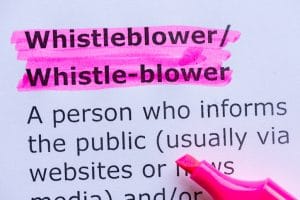A number of laws protect employees who report their employer’s wrongful acts.
 Employees often have a front-row view to what goes on in their workplaces — both good and bad. They may even witness their employers engaging in illegal or fraudulent acts, some of which may endanger public health and safety (such as taking shortcuts in food manufacturing, leading to the possibility of contaminated food). In many cases, these workers are afraid to report these actions to the government or a law enforcement agency, fearing that they will lose their job or otherwise be punished for blowing the whistle on these activities.
Employees often have a front-row view to what goes on in their workplaces — both good and bad. They may even witness their employers engaging in illegal or fraudulent acts, some of which may endanger public health and safety (such as taking shortcuts in food manufacturing, leading to the possibility of contaminated food). In many cases, these workers are afraid to report these actions to the government or a law enforcement agency, fearing that they will lose their job or otherwise be punished for blowing the whistle on these activities.
However, various laws provide protection to whistleblowers. If an employee reports something that they believe to be evidence of illegal activity and is penalized as a result, then he or she may be able to file a lawsuit against the employer under a whistleblower protection act. These laws are meant to encourage employees to report actions that violate the law, put public safety at risk, waste tax dollars or (for government employees) violate the public trust.
If an employer fires or punishes an employee who blew the whistle on wrongful conduct, then that employee can file a lawsuit against the company under a whistleblower protection law. There are a number of different whistleblower protection laws meant to address specific situations, such as environmental whistleblowers, corporate whistleblowers, government fraud, federal employee whistleblowers, and military whistleblowers. There are both state and federal laws that provide protection for whistleblowers; an experienced wrongful termination attorney will be able to discuss your specific situation and advise you about the laws that apply to your case.
In some situations, whistleblowers can be financially rewarded for blowing the whistle on fraudulent activity. For example, under the False Claims Act, if an employee reports fraud in government contracts, then he may be nestled to a portion of the amount recovered — up to 20 to 30 percent. This situation can arise in a number of ways. If a nursing home employee discovers that her employer is charging Medicare for services that they are not actually providing to patients, then she could report that information to the government. This employee may then be able to get a portion of whatever the government recovers from the nursing home for its fraudulent activity. If a person working for a company that manufactures equipment for the military finds out that shortcuts are being taken so that the products that are being delivered are not what the military ordered and paid for, then reporting that fraud could result in a payout for the employee if the government is able to recover money. Of course, not every whistleblower will be eligible for compensation. Talk to an experienced whistleblower attorney to analyze the specific facts of your case.
Employees should be encouraged to report dangerous, fraudulent or unethical activity. Unfortunately, in too many cases, they are punished instead by being demoted, fired or having another action taken against them. If you have reported an illegal activity by your employer and have been retaliated against as a result, PLBH can help. Our employment law attorneys are experienced in representing people who have been wrongfully terminated or discriminated against in retaliation for blowing the whistle or engaging in other protected activity. Contact our office today at (800) 435-7542 or info@plblaw.com to schedule an appointment and learn how we can help you.
